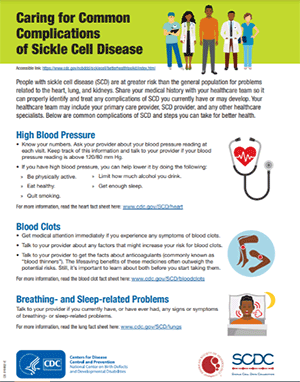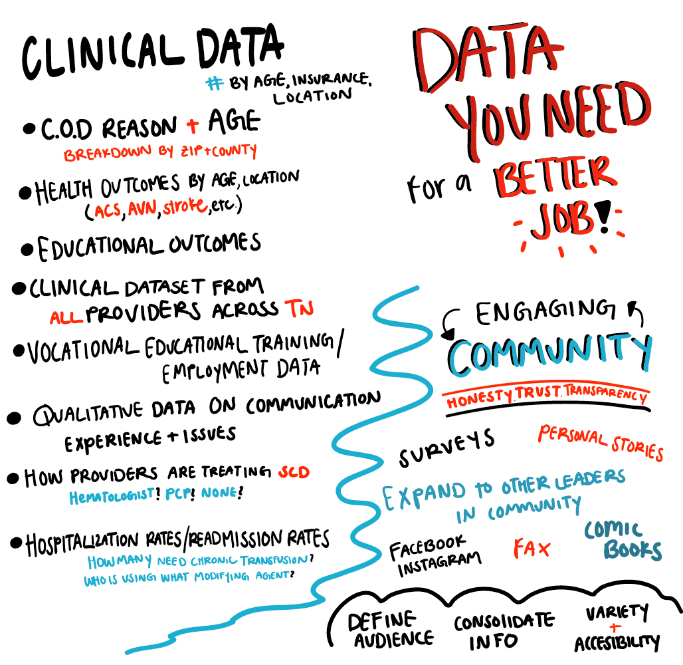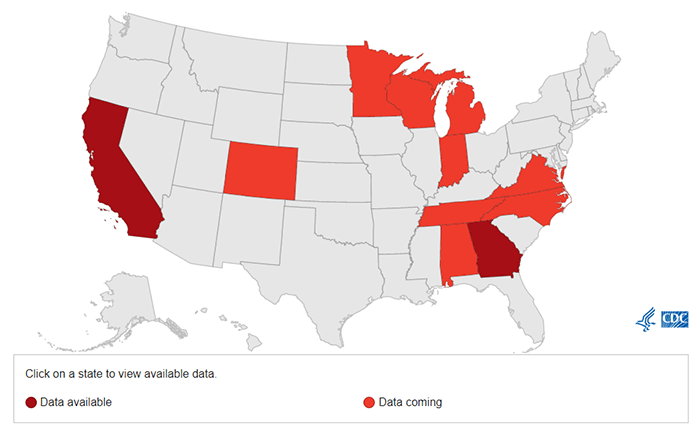The Bloodline Newsletter: Spring 2021

Mission: To improve quality of life, life expectancy, and health among people living with sickle cell disease (SCD).
Spring 2021
Communications Corner

- CDC is sharing the “Steps to better health for people with sickle cell disease” toolkit, which includes downloadable fact sheets and social media resources about the common complications of SCD and how patients can manage their health. The fact sheets include:
- Overview: Summarizes the common complications of SCD, including blood clots and heart, lung, and kidney problems, and provides links to more detailed fact sheets about each complication.
- Blood Clots: Provides steps to lower your risk of blood clots.
- Heart: Provides steps to manage high blood pressure.
- Lungs: Provides a checklist of the signs and symptoms of lung problems.
- Kidneys: Provides steps to manage and treat kidney issues, such as too much protein in the urine, anemia related to chronic kidney disease, and end-stage kidney disease.
- 3 Tips for Safe Use of Medicines: Provides tips for safe use of medicines prescribed for common complications of SCD.
- SCDC Georgia released the brief, “Older adults living with sickle cell disease,” which includes 2004–2016 data.
- CDC released the data brief, “Medicaid coverage patterns for people with sickle cell disease in California and Georgia, 2014–2016.”
Trainings & Webinars
- “New Data from CA SCDC“ (February 2021): The California SCDC program discussed new data sources and data totals, and presented on the upgrade to their data linkage system.
- “Community Engaged Education Materials for Sickle Cell Disease Gene Therapy” (May 2021): Data on the quality and accessibility of the current state of gene therapy patient educational materials were presented. Presenters made a case for the need to engage a variety of stakeholders (from scientists and clinicians, to patients and advocates) to create open-access educational materials to support informed decision-making for sickle cell gene therapy.
Up-to-Data
- SCDC Georgia responded to requests for SCDC surveillance data:
- The Georgia Department of Public Health’s Children’s Medical Services requested data on planning healthcare transition services for youth with SCD, including the use of current procedural terminology (CPT) coding for healthcare transition by providers, assessment of access to care due to loss of insurance coverage, and impact of care coordination services on health outcomes.
- The Sickle Cell Foundation of Georgia (SCFG) requested the possibility of obtaining income information for children with SCD to include in future funding applications and planning of SCD educational camps for SCD children of low-income households. SCFG also expressed interest in partnering with SCDC Georgia for future funding opportunities and collaborative research.
- The Lowndes County Health Department in Georgia, at the request of the mayor of Valdosta, requested data on the number of individuals with SCD residing in the county to address health issues in the area.
- The Michigan Department of Health and Human Services requested information from SCDC California and SCDC Georgia on how best to engage stakeholders, including topics for discussing SCD surveillance (data needs, data presentation) and formatting of meetings for an inclusive discussion.
- SCDC Georgia now has SCD mortality data from the Georgia Department of Public Health (through 2019); and clinical data from Grady Memorial Health (through 2020) and Children’s Healthcare of Atlanta (through 2020). SCDC Georgia will link data through 2019 in the coming months.
- SCDC Wisconsin has finalized the data use agreement with their state partners for newborn screening, Medicaid, and death records. They have also obtained data from the Wisconsin Newborn Screening Laboratory for 2013–2020.
Presentations & Meetings
- Each of the SCDC states conducted virtual site visits during the first months of 2021. Participants included stakeholders from the departments of Health, healthcare providers, public health researchers, community-based organizations, and SCD advocates.
- Here is one of the outputs of SCDC Tennessee’s site visit: Stakeholders were asked about their data needs and responded that they seek data that are quantitative, qualitative, audience-specific, and succinct. Overall, they seek more variety and accessibility in data reporting. Publication of the findings from SCDC Tennessee’s session is forthcoming.

Stakeholder Identified Data Priorities for SCDC TN
- Here is one of the outputs of SCDC Tennessee’s site visit: Stakeholders were asked about their data needs and responded that they seek data that are quantitative, qualitative, audience-specific, and succinct. Overall, they seek more variety and accessibility in data reporting. Publication of the findings from SCDC Tennessee’s session is forthcoming.
In The News
This section is shared to provide awareness of articles on SCD currently presented in the media. Linking to a non-federal site does not constitute an endorsement by CDC or any of its employees of the sponsors, information, and products presented on the site.
- Adaptive cognitive training program could help treat attention in kids with SCD
- Cure for sickle cell diseases inches closer with launch of gene therapy trial
- NIH scientists discover how DNA fragments can trigger inflammation in sickle cell disease
- How actress and producer Marsai Martin is using her platform to inspire young creatives in Hollywood
- AI helps assess pain levels in people with sickle cell disease
- Stem cell transplant, gene therapy in SCD tied to improved quality of life
- A single letter difference in a single gene spells a lifetime of anemia, pain worldwide
- Commentary: Living with a “forgotten disease”
- Integrative care is promising approach for sickle cell youth
- Novartis and the Gates Foundation pursue a more practical gene therapy for sickle cell disease
- Students challenged to create innovative tools to raise SCD awareness
Announcements
- In March 2021, the SCDC program expanded from nine to 11 states. The project aims to provide information that may be used to improve policy and healthcare standards, inform best practices, and illuminate pathways to deliver innovative treatments and cures in ways that can help address health disparities in SCD.

The SCDC program works with teams in the shaded states on the map above to collect and link data from several sources.
Contact
For any questions about the SCDC program, contact Mary Hulihan (ibx5@cdc.gov) or Mandip Kaur (wvx6@cdc.gov).
If you are not currently a subscriber, click the subscribe button below to get SCDC program updates.

